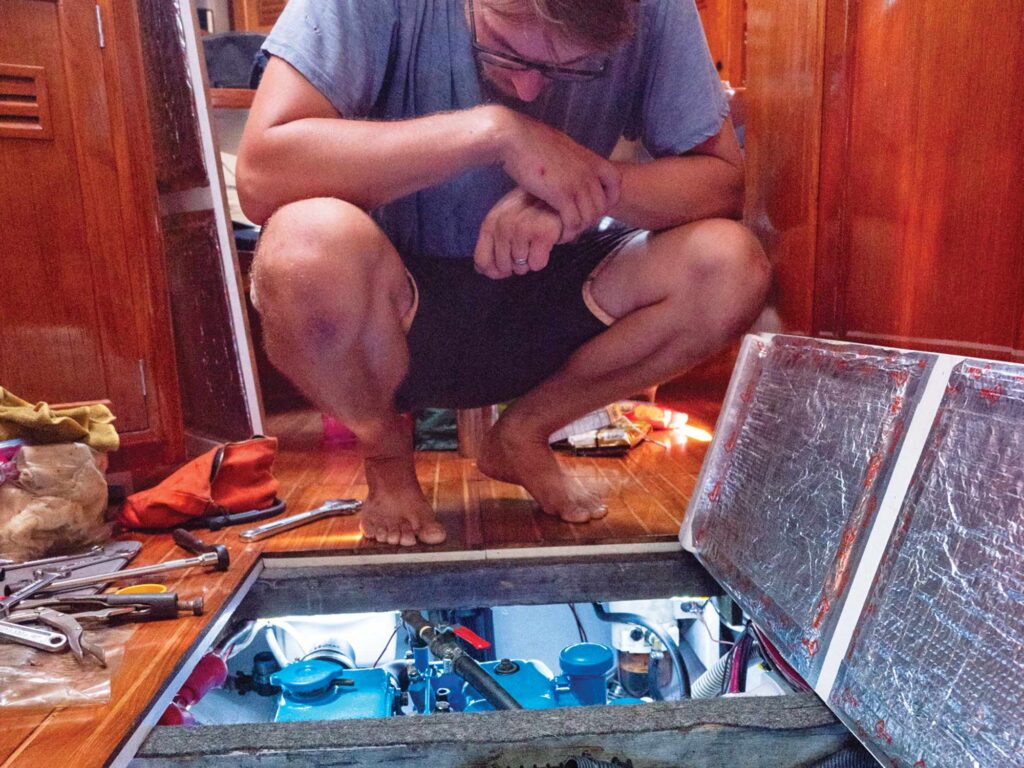Unraveling Efficiency: Diesel vs. Electric Propulsion
 My husband, Chris, and I decided to rebuild our Perkins 4.108 to extend her lifespan, preserve systems already in place, and save money.
Marissa Neely
My husband, Chris, and I decided to rebuild our Perkins 4.108 to extend her lifespan, preserve systems already in place, and save money.
Marissa Neely
Sailboats are revered for their eco-friendliness and the poetic dance with the wind that propels them forward. However, when it comes to auxiliary power, the debate about diesel engines and electric conversion has sparked considerable interest.
Here we’ll shed light on the times when sticking with an ol’ diesel might be a better choice than an electric conversion.
Energy Density and RangeOne of the primary reasons that diesel engines can be more efficient on sailboats is their high energy density. Diesel fuel packs significantly more energy per unit of volume compared with batteries used in electric propulsion systems. This high energy density translates to longer range and reduced refueling stops, making the engine more suitable for extended voyages, or for times when access to charging points is limited.
Modern diesel engines are designed to be fuel-efficient, providing better mileage per gallon of fuel compared with older models. Even by keeping older diesel engines well-maintained, you maximize the efficiency, thereby reducing fuel consumption and greenhouse gas emissions.
(Note that if you are using a gas-powered generator to supplement your power needs on the hook, you are potentially canceling out your sustainable efforts by going electric, and will also be carrying a highly flammable substance aboard.)
Simplicity and ReliabilityDiesel engines have a long-standing reputation for simplicity and reliability. They are time-tested, proven workhorses that require minimal maintenance and troubleshooting expertise. When a diesel engine experiences a problem, the diagnostics can be more straightforward compared with electric powertrains. Traditional mechanical issues, such as fuel-delivery problems or air-intake issues, are often easier to identify and address. Additionally, many components within a diesel engine can be repaired or rebuilt, such as fuel injectors, pumps, and turbochargers. This reduces the need for complete replacements, making repairs more cost-effective in many cases.
On the other hand, electric engines are continually improving, including becoming more serviceable. As electric vehicles gain popularity, mechanics are gaining experience in dealing with electric powertrains, and specialized training programs are more widespread. As a result, electric engines might become easier to work on in the future.
Weight and Space ConsiderationsFor sailboats, weight is a crucial factor that affects performance. Diesel engines, in general, are more compact and lighter compared with electric propulsion systems, particularly when considering the weight of batteries required for electric conversion. The added weight of batteries can alter the boat’s balance and potentially affect its sailing characteristics.
Sailors with smaller boats, or those seeking optimal performance, might find diesel engines a more suitable option because of their space-saving and lightweight nature. However, if you are able to compensate for the weight and space necessary to support an electric conversion without compromising your sailing efficiency, then electric might be the avenue for you.
CostDiesel engines remain relatively more affordable upfront, especially for retrofitting an existing sailboat. Purchasing and installing a diesel engine is generally less expensive than acquiring the necessary components for an electric conversion, including batteries, motors, controllers, and charging infrastructure. Batteries constitute a significant portion of the cost in electric conversions. Over time, batteries might require replacement, and this expense can be substantial.
Additionally, the cost of maintaining and repairing diesel engines can be lower because of their simplicity and the wide availability of spare parts and skilled mechanics.
However, the cost dynamics of electric propulsion systems are evolving rapidly. The increasing focus on environmental concerns and sustainability might lead to advancements and incentives that further promote the adoption of onboard electric propulsion.
SustainabilitySustainability is the hottest topic within this debate. While electric propulsion is undoubtedly a more sustainable option, maintaining an old diesel engine on a sailboat can be a responsible environmental choice in certain scenarios.
Producing new electric propulsion systems, especially batteries, requires significant amounts of raw materials and energy. This process can contribute to a larger initial environmental footprint. Replacing a functional diesel engine with an electric propulsion system also generates waste, including disposal of the old engine.
Battery disposal can present environmental challenges. By sticking with a diesel engine, you avoid the potential issues associated with battery recycling. And, if the electricity used to charge the batteries primarily comes from nonrenewable sources, such as coal or natural gas, then the overall environmental benefit might be diminished compared with a well-maintained diesel engine.
The Choice Is YoursThe right option ultimately boils down to individual preferences, usage patterns and environmental considerations. Electric propulsion is undoubtedly a more sustainable option for the future of sailing and is likely to become more competitive with diesels in terms of efficiency and range, but for now, both options offer distinct advantages, and the decision rests with each sailor’s circumstances. —Marissa Neely
Marissa Neely has lived aboard her 1979 Cheoy Lee 41, Avocet, with her husband, Chris, since they bought the boat in 2018. Follow them on YouTube at “Sailing Avocet,” or go to svavocet.com.
The post Unraveling Efficiency: Diesel vs. Electric Propulsion appeared first on Cruising World.
- Home
- About Us
- Write For Us / Submit Content
- Advertising And Affiliates
- Feeds And Syndication
- Contact Us
- Login
- Privacy
All Rights Reserved. Copyright , Central Coast Communications, Inc.